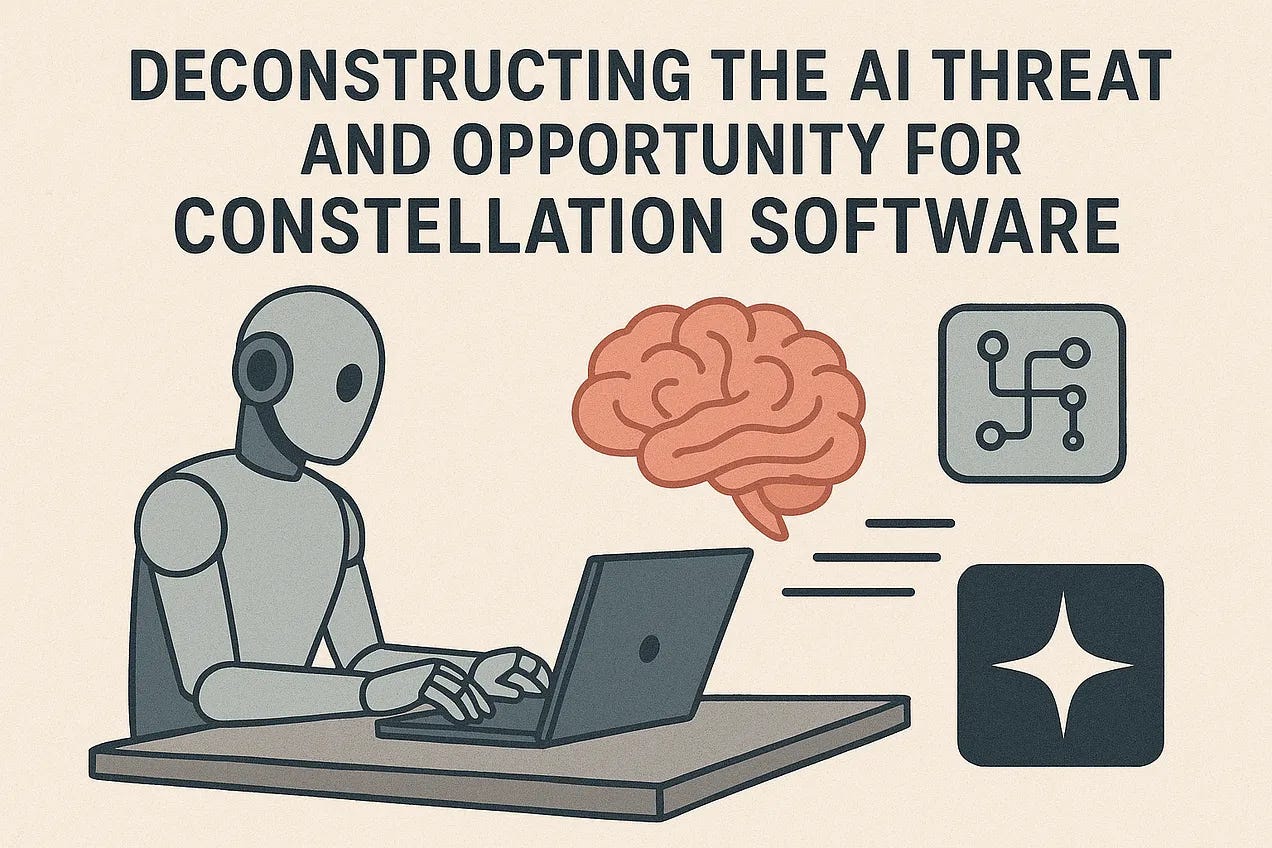Deep Dive Brief: Constellation Software and AI - Part II
Deconstructing the AI Threat and Opportunity for Constellation Software
Expanse Stocks x Finchat (now Fiscal AI) Partnership!
🎁 Get 20% off + 2 months free on any plan! →🔗 Claim Discount
Welcome back Explorer!
In this twelfth edition of my Deep Dive Briefs series and second installment of the Constellation Software (CSU) trilogy, I’m continuing my research journey on this serial acquirer, this time, we’re diving into a big, hot topic:
After the success of my first installment on this CSU trilogy, 🔗 Constellation Software Capital Allocation Outlook - Part #1, the next topic to cover felt pretty obvious to me, but also harder to assess.
One of the most frequent questions investors ask themselves these days revolves around Artificial Intelligence and its impact on established business models. Every industry seems to be in the crosshairs, and investors are rightly asking: who are the winners, and who are the value traps?
So, where does a company like Constellation fit in?
For years, CSU has been the gold standard of disciplined capital allocation, a quiet compounder that buys and holds hundreds of "boring" vertical market software (VMS) businesses. It’s the antithesis of the typical high-growth, cash-burning tech story. On the surface, its vast portfolio of legacy software seems like a prime target for disruption by nimble, AI-native startups.
After digging into this topic, my conclusion points in the opposite direction. I believe Constellation Software’s model is not structurally at risk from AI; rather, AI is an accelerant *if* managed correctly.
Topics We’ll Cover
🔹 A Quick Refresher on the CSU Machine
🔹 The AI Disruption Narrative
🔹 Mapping the AI Battleground
🔹 The "Vertical AI" Thesis
🔹 The Potential Evolving Playbook
🔹 The Real Risk Isn't AI Disruption
🔹 Comparing CSI with its Spin-Offs
🔹 Conclusion & What I'm Watching
This article couldn’t come at a better time. Constellation Software and Mark Leonard just announced an open-discussion shareholder meeting on September 22nd at 9:00 E.T. Management, along with their AI specialist team, will be walking through how AI could impact their business. Exciting, to say the least, don’t you think?
If you haven’t found the link yet, here’s the official announcement:
🔗 Constellation Software Inc. Announces Conference Call to Discuss AI’s Impact on Software Businesses
With that in mind, I thought it would be interesting to share my own take ahead of the call. That way, we can contrast my thoughts with management’s perspective. Let’s dive in!
📰 What’s New at Expanse Stocks?
📊 Quarterly Update - Portfolio Composition (by Industry and Geography) + Valuation Metrics → 🔗 Behind-The-Scenes [Free access]
📚 Articles
🔎 Deep Dive Briefs
⛅ Cloudflare | 👷♂️ Parsons | 𓇲 MPS | 🥼 Medpace | 🔌 Arista | 🛒 Amazon | 🤖 ASML | 🦎 Topicus | 💡 Lumine | ✈ HEICO | 🧙♂️ CSU Part #1, Part #2, Part #3 | 🤖 Intuitive
💸 General Investing
💎 Hidden Gems Series
✨ Annual Specials – Annual Letters, Investing Philosophy, Industry Write-ups & Top Picks of the Year
📚 Resources for Investors
📢 Latest Stock News
💬 Join My Chat → [📎 Learn more]
🔐 Paid Subscriber Exclusives
💼 Portfolio Corner – Holdings, valuation models, trades, performance & more!
🤫 Exclusive Sections – From select articles, Deep Dive Briefs & Hidden Gems
👀 Recent Releases!
👀 Coming Soon
✨ The Rareness of Moaty Industrials: A Selection of 6 Gems
💎 Hidden Gem: Special Edition III
A Quick Refresher on the CSU Machine
Before we can analyze the impact of AI, we must first appreciate what makes CSU so unique. Unlike horizontal SaaS giants that chase massive markets, CSU’s model is built on acquiring and holding mission-critical software for niche industries.
Think about the software that runs a local library, manages a municipal court's case files, or handles the billing for a rural utility company. This is CSU’s turf. These VMS businesses thrive on a different set of economics:
Deeply Embedded Workflows: This software is the central nervous system of a customer's operation. It's not a discretionary tool, it's a "must-have."
High Switching Costs: Migrating years of historical data, retraining entire teams, and ensuring regulatory compliance makes ripping out a VMS a painful, expensive, and risky proposition.
These switching costs aren't just financial, they are operational as well. When your software manages patient records, inventory, or regulatory compliance, the risk of something going wrong during a transition can be business-threatening. Why would you jeopardize your entire operation to save a few hundred dollars monthly?
Durable, Predictable Revenue: While the market for any single VMS is small, its revenue is sticky. Customers rarely leave, leading to high retention and predictable cash flows.
CSU's genius has been to create a decentralized M&A engine that hunts for these small, durable businesses, acquires them with cash flow at disciplined prices, and holds them forever.




